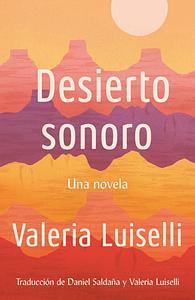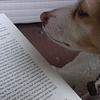Take a photo of a barcode or cover
4.5 - I did quite enjoy this book. I found its writing style quite intriguing (no proper names, moments without quotations even with dialog...). It took me a bit longer to read than it might have otherwise, because I took a few breaks, but I am glad that I read this. :)
I have heard so many fantastic reviews of LOST CHILDREN ARCHIVE by Valeria Luiselli, so I was happy to pick it up when I needed a book featuring immigration.
LOST CHILDREN ARCHIVE follows a family on the road, a mother and a father with their two children. Both having been single parents, they met, fell in love, and merged their families while working on a project to record the sounds of New York. With that project done, they now are moving on to new things and those things may be different for each of them.
They pack up what they can in boxes and pack up the car to drive cross country to Apacheria, the place once inhabited by the Apaches, a people who fascinate the father. The mother is caught up in the immigration crisis at the border she keeps hearing about on the radio. Thousands of kids have been lost, detained at the U.S. border or just lost and missing.
I found this book fascinating and even moreso on audio. The format of the book switches POVs between the parents and the children’s perspectives. The audio includes extra embellishments like sounds being recorded and added effects and multiple voices to enhance the storytelling. The book really weighs into the idea of oral storytelling tradition which is highlighted on audio.
I will say that this book wasn’t what I really expected. The main focus really is on the breakdown of the family relationship and the strain that creates as they move across the country. I did expect a bit more about the lost children, but I thought the author did a good job of bringing those painful truths into the story. The children, known primarily as ‘the boy’ and ‘the girl’ will most likely be separated as their parents go their separate ways and the parents themselves weight the consequences of the loss as well.
I thought this was beautifully written. There were times when the pace felt a bit slow, but I really was engrossed in the language and the story as a whole.
LOST CHILDREN ARCHIVE follows a family on the road, a mother and a father with their two children. Both having been single parents, they met, fell in love, and merged their families while working on a project to record the sounds of New York. With that project done, they now are moving on to new things and those things may be different for each of them.
They pack up what they can in boxes and pack up the car to drive cross country to Apacheria, the place once inhabited by the Apaches, a people who fascinate the father. The mother is caught up in the immigration crisis at the border she keeps hearing about on the radio. Thousands of kids have been lost, detained at the U.S. border or just lost and missing.
I found this book fascinating and even moreso on audio. The format of the book switches POVs between the parents and the children’s perspectives. The audio includes extra embellishments like sounds being recorded and added effects and multiple voices to enhance the storytelling. The book really weighs into the idea of oral storytelling tradition which is highlighted on audio.
I will say that this book wasn’t what I really expected. The main focus really is on the breakdown of the family relationship and the strain that creates as they move across the country. I did expect a bit more about the lost children, but I thought the author did a good job of bringing those painful truths into the story. The children, known primarily as ‘the boy’ and ‘the girl’ will most likely be separated as their parents go their separate ways and the parents themselves weight the consequences of the loss as well.
I thought this was beautifully written. There were times when the pace felt a bit slow, but I really was engrossed in the language and the story as a whole.
Wow, this book. I sincerely enjoyed the first half, in Mama's perspective, and underlined quite a lot of it. I felt like I learned about the border crisis but also about a myriad of other general knowledge. It was also a poignant story about a mixed family and the slow dissolution of a marriage.
I didn't love the boy's perspective as much until it got to the "Echo Canyon" section when the major storylines converge in a sweeping, single sentence that picks the pace up and lands us back into safety.
I'm so glad I read this book...I feel like a better person for it.
I didn't love the boy's perspective as much until it got to the "Echo Canyon" section when the major storylines converge in a sweeping, single sentence that picks the pace up and lands us back into safety.
I'm so glad I read this book...I feel like a better person for it.
This was a truly brilliant book - close to being 5 stars! The writing and use of language was so artful, and even though the plot wasn't something that would usually interest me, I was drawn in and became very invested in the family and their journey across America. The weaving of immigration/border politics with the family's road-trip was so interesting and really brought the issues to life, making you feel such great empathy for the lost children travelling from Mexico to America. The characterisation was also phenomenal. Despite the children not really having names and just being called 'the boy' and 'the girl', they were the stars of the show, propelling the story forward and providing the most interesting commentary in my opinion. I listened to the audiobook of this and I would highly, highly recommend it as it really brought the story to life. Definitely worth picking up if you want a beautifully written and moving story about family, safety, and belonging.
4.5
American road trip novel meets border story with multimedia fragments and narration shifts, with beaucoup allusions.
In a word: intricate.
This book encourages (and rewards) creative and active reading-- pulling on threads of theme and pursuing allusions and picking out patterns woven through echoes and archival boxes and narrators and palimpsests...
Near the midway point of the book, the unnamed mother shares about a trip she had once taken with her mother. She reflects, "That encounter with our mother, though it was a failed adventure, planted a seed in me that would later, as I grew older, flower into a deeper understanding of things... Or perhaps the right word is not understanding, which has a passive connotation. Perhaps the right word is recognition, in the sense of re-cognizing, knowing again, for a second of third time, like an echo of a knowledge, which brings acknowledgement, and possibly forgiveness." (174) Similar might be said of this book itself: "understanding" seems too passive for the spiraling process of reading and making meaning of the fragments here, though it does build (re)cognition.
The piece I didn't love: the conflation of different "losts" feels maybe even a little exploitative?
Enjoyed the reading, stuck on the ending and what/who it centered.
American road trip novel meets border story with multimedia fragments and narration shifts, with beaucoup allusions.
In a word: intricate.
This book encourages (and rewards) creative and active reading-- pulling on threads of theme and pursuing allusions and picking out patterns woven through echoes and archival boxes and narrators and palimpsests...
Near the midway point of the book, the unnamed mother shares about a trip she had once taken with her mother. She reflects, "That encounter with our mother, though it was a failed adventure, planted a seed in me that would later, as I grew older, flower into a deeper understanding of things... Or perhaps the right word is not understanding, which has a passive connotation. Perhaps the right word is recognition, in the sense of re-cognizing, knowing again, for a second of third time, like an echo of a knowledge, which brings acknowledgement, and possibly forgiveness." (174) Similar might be said of this book itself: "understanding" seems too passive for the spiraling process of reading and making meaning of the fragments here, though it does build (re)cognition.
The piece I didn't love: the conflation of different "losts" feels maybe even a little exploitative?
Enjoyed the reading, stuck on the ending and what/who it centered.
Not what I thought it would be at all, but I found this dense, allusive novel very compelling, and read it surprisingly quickly. Rather than a straight-forward narrative about migrant children on the US southern border, Luiselli has focused her tale on a blended NYC family's road trip to the southwest. The family is disintegrating, the parents have competing creative projects, and they travel across America capturing sounds and 'echoes' with their sound recording equipment and the son's Polaroid - can you prevent loss? can you capture what is lost/has been lost/will be lost and archive or collect it?
El título original del libro te prepara más para los temas que se van a tratar, que aunque se hagan de forma muy muy bonita son realmente muy muy duros.
emotional
reflective
sad
tense
slow-paced
Plot or Character Driven:
Character
Strong character development:
Complicated
Loveable characters:
Complicated
Diverse cast of characters:
Yes
Flaws of characters a main focus:
Yes
*3,5 stars*
Some parts I thoroughly enjoyed, while other parts became a bit boring and repetitive. I really liked the composition of the novel as an archive, but it also because very literary heavy with so many references to art and literature woven into the narrative. The prose was very beautifully written and it had a sort of eerie and gloomy feel to it even though it was a contemporary. Most likely, I feel this way because of the subject it discussed in a very affective way
Some parts I thoroughly enjoyed, while other parts became a bit boring and repetitive. I really liked the composition of the novel as an archive, but it also because very literary heavy with so many references to art and literature woven into the narrative. The prose was very beautifully written and it had a sort of eerie and gloomy feel to it even though it was a contemporary. Most likely, I feel this way because of the subject it discussed in a very affective way
I just...didn't really like this book. Found it a bit hard to stay engaged and didn't really feel like anything truly happened.
DNF at 25%
I read Luiselli's book, Tell Me How it Ends, and really enjoyed that one. What I liked most about it, I think, is how she said so much in so few words. She does the exact opposite in Lost Children Archive.
This one is supposed to be fiction, but it reads like a non-fiction book written by a long-winded journalist. I feel like she has important things to say, but she writes circles around herself and just goes on and on without ever getting anywhere. I just couldn't do it anymore.
I read Luiselli's book, Tell Me How it Ends, and really enjoyed that one. What I liked most about it, I think, is how she said so much in so few words. She does the exact opposite in Lost Children Archive.
This one is supposed to be fiction, but it reads like a non-fiction book written by a long-winded journalist. I feel like she has important things to say, but she writes circles around herself and just goes on and on without ever getting anywhere. I just couldn't do it anymore.



